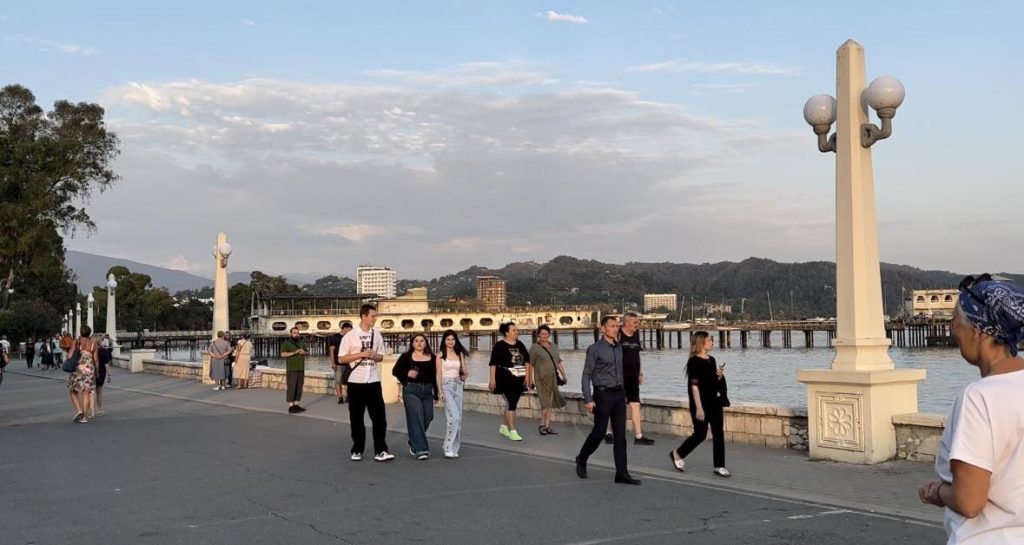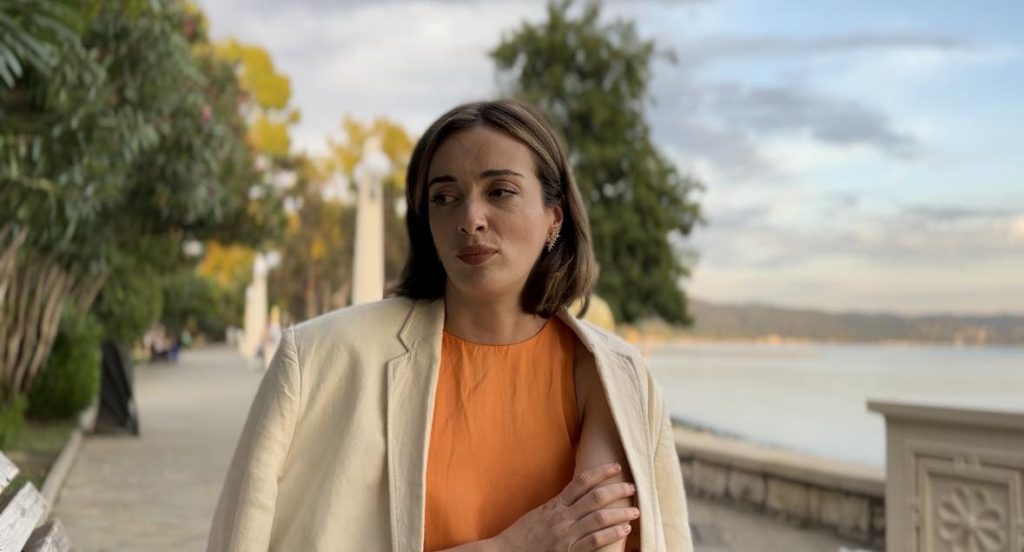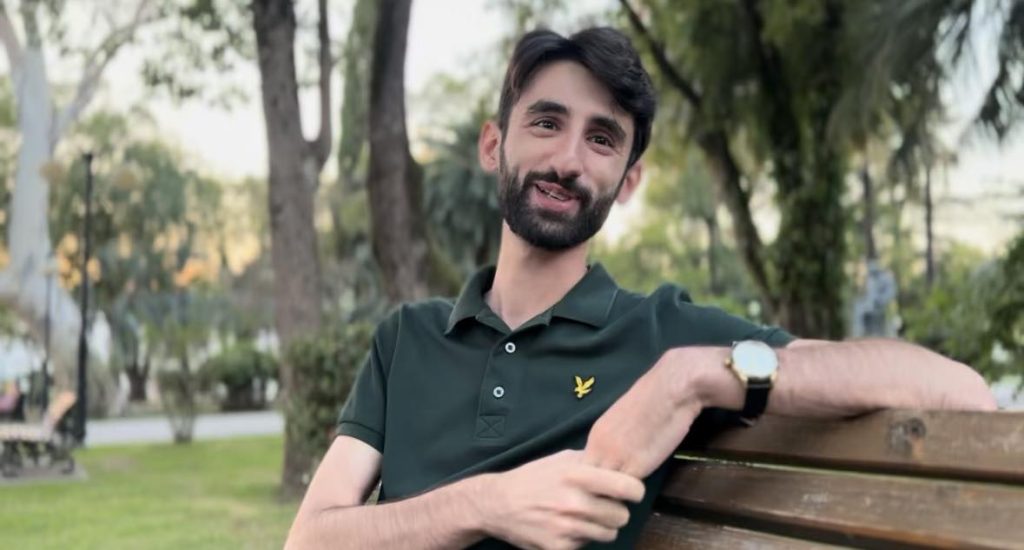"The world denies our existence". How Abkhazia's young people are doing after EU sanctions
Abkhazian youth

In October it will have been a year since the EU decided not to recognize and, accordingly, not to put visas in Russian passports issued on the territory of Abkhazia and South Ossetia, which the EU considers occupied by Russia.
This means that the population of this small republic on the shores of the Black Sea, recognized only by Russia and four other UN member states, has found itself without the right to travel to the EU.
JAMnews spoke to experts and young people about the everyday reality of closed borders.
Valeria Arshba is 24 years old and a graduate of Abkhaz State University, Department of International Relations.
She wanted to become a diplomat in order to seek international recognition of Abkhazia, to talk about the history of her country and defend its interests on various platforms.
Valeria has dual citizenship – Abkhazia and Russia. She obtained Russian citizenship and a passport at the Abkhazian embassy in Russia. With this document she did some traveling for studies and tourism.
She says that after February 2022 things became even more complicated in terms of movement for Abkhazians.
“This is an unfair decision, my friends and I wrote articles, open letters, we wanted to somehow reach out. Anything can happen in the world, history is dynamic. But human opportunities and rights, regardless of nationality and citizenship, should not be limited. In fact, the world denies my existence because it has a conflict with Russia,” Valeria says.
- “How Abkhazia was alienated, how the Abkhaz nation was formed and how we ended up with separatism”. Blog of historian Beka Kobakhidze
- A luxury cell in an Abkhazian prison. Video tour
When the European Union banned visas for passports issued in Abkhazia, she was forced to get a new passport in Russia.
“All this made my life very difficult. It was a complicated bureaucratic procedure. I was lucky, not everyone has the opportunity to get a passport in Russia.”
Abkhazian documents
In Abkhazia, people have two types of documents.
About 60 percent of the population of Abkhazia has dual citizenship. Many received a Russian passport before 2008. Dual citizenship in Abkhazia was issued under a simplified procedure. Issuing Russian passports to citizens of the unrecognized republic, the Russian Federation argued that they were stateless persons. However, after Russia recognized the independence of Abkhazia in 2008 and established official diplomatic relations with Sukhum, the simplified system was abolished.
In 2022 the simplified system was supposed to return — at the end of September 2022 Russia even signed an agreement with Abkhazia on settlement of issues of dual citizenship. But almost simultaneously with the signing of this agreement the European Union said that it refused to recognize Russian passports issued in Abkhazia. Accordingly, it is impossible to obtain a Schengen visa on such a passport.
The remaining 40 percent of Abkhazians have only an Abkhazian passport, with which they cannot travel anywhere except the Russian Federation. This passport is not recognized internationally.
The EU decision, an expert of the Office of the Commissioner for Human Rights in Abkhazia, Astan Khashig, believes unambiguously violates the rights of residents of the Republic.
“Non-recognition of Russian passports issued in Abkhazia limits the rights of Abkhazians to receive even medical care in the EU zone. Yes, it is possible to go somewhere else for treatment. But people are deprived of choice. And this is a significant violation of rights.”
Astan himself is 25 years old and studied in Moscow, but after graduating from university he went home.
“Many of my peers used Russian passports to get education outside the country. Whether it was higher, additional or some courses. Such plans are now over with.”
Milana Lomiya has never had Russian citizenship, only Abkhazian. At 28 she was the leading actress of the State Russian Drama Theater named after Fazil Iskander has no Russian citizenship, only Abkhazian. She has never been anywhere but Abkhazia or Russia.
Abkhazian youth

The young actress says that because of her Abkhazian passport she has missed a lot of opportunities related to study and work.
Milana says that although Russia recognizes the Abkhazian passport, it is not easy to get a job with it even in Russia.
“The lack of (Russian) citizenship complicates life in various ways. For example, you can’t just go and make a movie. You have to make a work permit, some other package of scary documents. This is a severe restriction in the profession for me. That is, even if I am now approved somewhere, to go to the shooting – it is a whole problematic process.”
Milana recalls when she had a chance to star in a Russian TV series:
“Danila Kozlovsky was shooting his series “Karamora”, and when he was looking for actors, he saw a video of me reading Brodsky. I was found, I recorded an audition, liked. And then everything was slowed down by problems with documents. And then it turned out that the shooting takes place on the territory of Georgia. That’s where everything fell apart.”
Russia as the only way out
Education expert Rustam says that Abkhazia felt sanctions against the Russian Federation quite acutely, because for them, Russia is the only way into the wider world.
“Here you have to understand that we have always had limitations. In fact, we have been living all these years under sanctions – the world does not recognize Abkhazian passports. And it should be understood that access to all sorts of opportunities, both inside our country and abroad was given to us by Russia. If we had to go somewhere, we applied for visas through Russian passports and visa centers. Of course, after 2022 the situation changed very much and all restrictions against Russia became restrictions against Abkhazia. For example, many educational programs were closed for Abkhazian young people because Russia was excluded for them.”
Abkhazian youth

Astan Khashig believes that initially the main violation of the rights of residents of Abkhazia is that there is no talk about recognizing Abkhazian passports as travel passports. In his opinion, the more the West restricts the residents of Abkhazia with sanctions, the more they depend on Russia.
“The world community is essentially in an information vacuum, where the only mouthpiece is Georgian propaganda. It seems to me that in the current circumstances one can not even think that our documents will be recognized. It is more likely that all sanctions against Russia will be canceled.”
Lera Arshba says that for her, as a diplomat, the closed borders are doubly tragic. She is acutely worried about the impossibility to work in her specialty: according to her, service in today’s Abkhazian Foreign Ministry, does not meet her interests and expectations, so she prefers to stay in the private sector.
“Today I do not work in the civil service. The goal there today is not to improve Abkhazia’s foreign policy relations with other states. Or just at least to broadcast to the big world about Abkhazia. Such tasks that I dream about are not there. Today’s civil service is just bureaucracy and routine.”
“Plus, now there are added priorities that are not close to me,” she adds, “if you want to work in the Foreign Ministry, you have to work for the image of a particular person and for merging Abkhazia with Russia forever.
Abkhazian youth
The main fear is war
All of those we spoke to admitted that their main fear is not sanctions, but war.
A popular idea in Abkhazia is that their eastern neighbor Georgia is considering a “second front” in Abkhazia and that it has long been urged to do so by some Western politicians. Russia is also constantly warning about such a threat.
“Who likes to hear all the time that a war could break out in your country? It’s some kind of constant speculation, theories. Naturally your state at this moment is full of worries, emotions,” Lera Arshba says.
Abkhazian youth


















